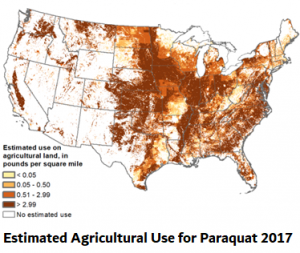Parkinson’s fighters nationwide amassed more than 100,000 signatures on a petition to the Environmental Protection Agency (EPA). They also sent thousands of emails and phone calls to Congress asking for the EPA to reconsider the evidence that paraquat causes brain damage and other harm. The EPA finally relented late last year to re-examine the safety of paraquat, which could result in its being banned in America. Fifty other countries have already banned it.
Related: EPA asks Court to let it reconsider Paraquat review
EPA has, for years, declined to discuss potential changes to its long-criticized position on paraquat, regardless of research which shows it is not as safe as advertised. The agency will now prepare new analyses of paraquat’s risk-cost benefit. EPA will accept public comment on the new analyses expected to be proposed in roughly a year.
EPA delays Lawsuit with Review
In December 2022, the Ninth Circuit court granted the EPA’s request to pause a lawsuit that challenges the agency’s interim registration review decision to reapprove paraquat use.
EPA requested the abeyance, indicating that it intends to examine issues raised by the lawsuit Earthjustice. That group filed suit on behalf of farmworker, public health, and environmental advocacy groups.
“Paraquat is the most dangerous herbicide still on the market. As the [EPA] readily admits, ‘One small sip [of paraquat] can be fatal, and there is no antidote.’ In addition to its high acute toxicity, it also presents a range of chronic concerns, including cancer, damage to the reproductive system and organs like the kidney and liver. It also poses hazards to birds and bees, and is prone to leaching into groundwater, where it disrupts the stability of aquatic ecosystems.'” — Beyond Pesticides
The examination will include EPA’s assessments of human health risk, benefits and risk-benefit balance for paraquat. The agency plans to issue related documents by January 2024. Then – according to court records — after considering public comments, EPA says it will update documents “as appropriate” by Jan. 17, 2025.
EPA’s deputy director of programs at its Office of Pesticide Programs, Michael Goodis, said: “These documents will assist [EPA] in assessing whether any changes to the paraquat interim registration review decision or other action concerning paraquat are necessary.”
The Earthjustice lawsuit challenged the EPA’s interim decision in July 2021 to approve the continued use of paraquat. Introduced in the 1960s, this highly toxic poison is one of the most widely used “herbicides” in the U.S.
What is an Herbicide?
Britannica.com says an herbicide is an “agent, usually chemical, for killing or inhibiting the growth of unwanted plants, such as residential or agricultural weeds and invasive species. A great advantage of chemical herbicides over mechanical weed control is the ease of application, which often saves on the cost of labour. . .”
Related: Herbicide, Pesticide – What’s the difference?
Britannica also claims — as do all chemical companies — that “most herbicides are considered nontoxic to animals and humans,” but that claim is highly debatable, as we have all seen in the Monsanto Roundup litigation.
Earthjustice notes that 50 countries have banned paraquat over its health risks. In the U.S., however, more than 8.5 million pounds of it are still dumped each year on cotton, soybean, grape, and other fiber or edible crops.
Jonathan Kalmuss-Katz, a senior attorney with Earthjustice, said in a statement:
“With paraquat banned in dozens of countries, there is no reason to allow it to continue to harm farmworkers and agricultural communities here. [The] EPA must use this opportunity to do what it should have done years ago and take this highly toxic herbicide off the market once and for all.”
EPA Violated Federal Rules
The Earthjustice-represented groups argued that the EPA’s interim decision on paraquat violated the Federal Insecticide Fungicide and Rodenticide Act. That Act requires EPA to establish that pesticides and herbicides won’t cause “unreasonable adverse effects” to human health or the environment. The groups allege EPA approved paraquat for another 15 years despite serious concerns it may cause Parkinson’s, other diseases, and/or death.
Paraquat has become the target of mass tort litigation that includes a pending MDL court in Illinois against Syngenta AG. Syngenta’s Gramoxone products contain paraquat.
An EPA spokesmodel said the agency is reviewing the Ninth Circuit’s decision.
The Ninth Circuit’s order to delay the suit includes a requirement for status updates every 90 days from now.
The case is California Rural Legal Assistance Foundation et al. v. U.S. Environmental Protection Agency et al., case number 21-71287, in the U.S. Court of Appeals for the Ninth Circuit.
RELATED
- Paraquat Lawsuits Pending
- Do Pesticides cause Parkinson’s?
- Pesticide Lawsuit | Attorney
- Paraquat: A Non-Selective Killer with a Dark Past

by Matthews & Associates




